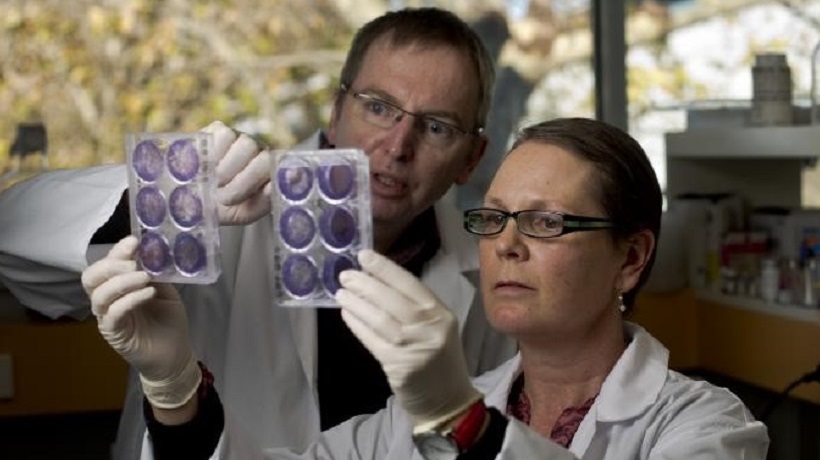Behind the science: Dr Geoff McCowage

After more than a decade of research, specialists are now potentially two years out from human treatment with an exciting, new gene therapy that could eradicate specific cancers.
For a while now, an exciting treatment has been available for leukaemia sufferers. It involves removing and purifying white blood cells from the patient, then modifying them to target them against the leukaemia. Then the cells are given back to the patient. Those cells then target and kill the disease.
It doesn’t even need to involve the patient’s white blood cells – they could come from somebody else.
This exciting and proven treatment is known as called CAR T-cell therapy. Just as a virus might be introduced into a computer in order to have a specific effect, it involves the introduction of a virus into white blood cells, to attack cancer cells in the body. Like Trojan horses, the white blood cells carry the virus to the cancer. The virus then dies once its job is done.
While this treatment is specific to leukaemia, Dr Geoff McCowage, a Senior Paediatric Oncologist at The Children's Hospital at Westmead, is working with his Cancer Gene therapy team on utilising CAR T-cell therapy as a treatment for other types of cancers.
In particular, Dr McCowage is focussing on osteosarcoma and Ewing sarcoma - bone and soft tissue tumours more common in those below the age of 20.
“Some of these tumours, as well as a few particularly nasty brain tumours, have something known as EthA2 on their surface, and normal tissues do not have EthA2 on their surface,” Dr McCowage explained.
“We’re using that as our target, making CAR T-cells with a gene that targets EthA2, instead of leukaemia. The idea would be to test the patient, and if EthA2 is present then this could be a treatment option.”
Testing on mice has offered encouraging results, with the new versions of T-cells eradicating the tumour. This outcome was an exciting one for the research team, as it proved cancer cells with EthA2 on their surface could be killed by the new treatment.
The next step is to seek approval to progress to human trials to check the treatment is safe and effective.
What we want to do, eventually, is to have a patient who has one of these tumours and where we don’t have full treatment.
Then we want to collect their white blood cells, purify them, genetically modify them, and give them back, the same way it is sometimes done for leukaemia.
While we hope that the modified blood cells will go off and eradicate the cancer in the patient’s body, we’ve got to be careful that there isn’t some normal tissue that would also be damaged. It’s very hard to prove that there isn’t. That is the process we’re going through, now.
Most exciting is that the research will be accelerated by the fact that similar treatment is already being employed for leukaemia patients. It means McCowage’s team does not have to start at square one for certain parts of the efficacy-testing process.
Of course, the big question is when such treatment might enter the clinical testing phase on humans. Incredibly, the potential start date is not as far away as one might expect.
“We would hope that we might be able to treat real patients with this technology by 2021,” McCowage said. “Right now, it seems that within a couple of years we might be well placed to treat humans.”
“But it has been a long road. This work actually builds on an earlier gene therapy trial, also supported with a lot of funding by The Kids’ Cancer Project, that looked at brain tumour gene therapy."
Read more: Development of CAR T cell immunotherapies for paediatric patients.
"We were the first in this country to make our own models of the gene vectors. We built the capacity to make these viral vectors and to do gene transfer with human beings.”
The Kids’ Cancer Project raises money over the long haul to support very important research.
Knowing that they are there for the long haul is very powerful for us. Knowing that they have long-term vision and recognise the value of the work that develops pieces of a puzzle that will make a real difference in the future – as this work is beginning to do – has been hugely important for us as researchers.
Not only that, but The Kids’ Cancer Project has been a huge supporter for us in many other ways...They’re an important lobby group and advocacy group. Their advocacy with Health Ministers, with other funding bodies and with granting bodies is incredibly important.
“Without The Kids’ Cancer Project, we simply wouldn’t have the knowledge that we have today to be developing some of these exciting therapies.”

